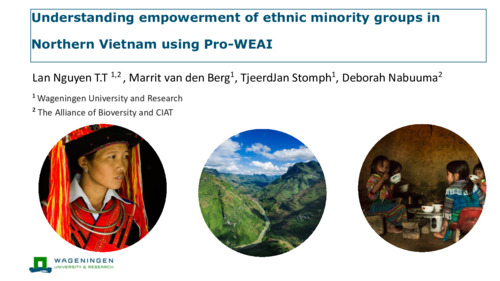Understanding empowerment of ethnic minority groups in Northern Vietnam using Pro-WEAI
Abstract
Women’s empowerment is of paramount importance in agriculture, food security and nutrition, making it the focal point of nutrition-sensitive agriculture (NSA) projects. However, the specific pathways and impacts of such interventions on women’s empowerment is still not fully understood, partly due to lacking of consensus of measurement approaches across projects. Moreover, understanding of men’s empowerment, which is integral to comprehensively grasping the dynamics of women’s empowerment, remains limited. In this study, we examined the empowerment level of ethnic minority men and women in Northern Vietnam, focusing on the impact of a gender-neutral NSA using the internationally validated pro-WEAI tool. The NSA included two interventions: nutrition and agriculture training, and seed provision. Our sample consisted of 1,160 individuals (609 women and 551 men) residing in 38 villages grouped into 36 clusters. Our findings showed that that both men and women experienced disempowerment, suggesting that both groups subjected to external constraints rather than gender stereotypes. However, women remained the more vulnerable groups compared to men in various domains. We also identified some impacts of both interventions on individual indicators within three domains of empowerment (3DE). After multiplicity correction, several effects remained significant, including effects of training intervention on women’s mobility, and seed provision on total score of intrinsic agency domains. These results not only contribute to the establishment of benchmarks for interpreting pro- WEAI scores across program, but also emphasize the importance of investigating the impact of development

